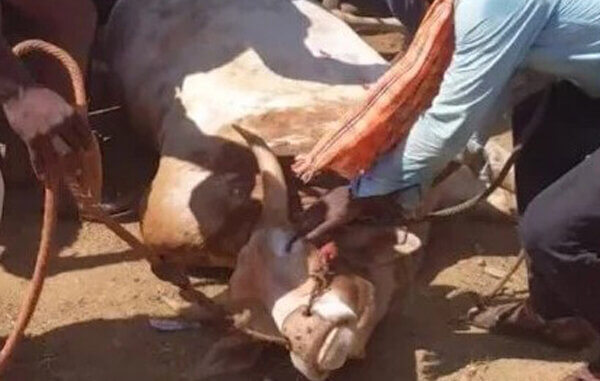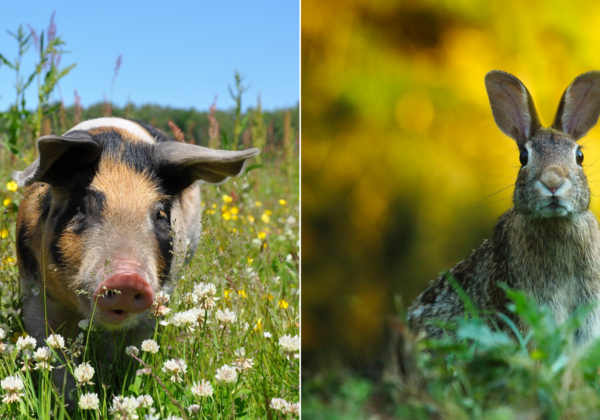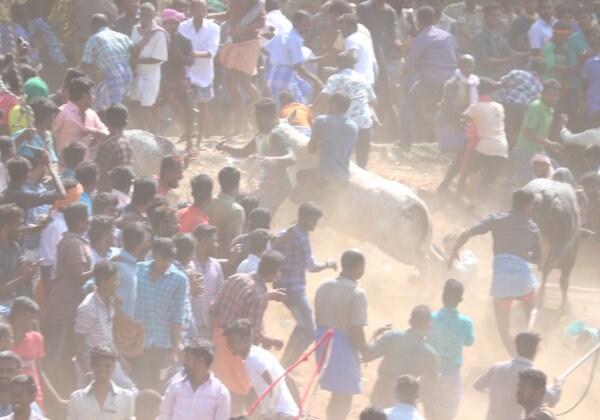Here’s Proof That Disregard for Animals in Jallikattu Leads to Disregard for Humans
Psychologists and sociologists have long been warning that those who are violent towards animals often go on to become violent towards humans as well. For example, in the UK, a study of 23 families with a history of neglecting animals showed that 82 percent had children at risk of abuse or neglect.
In the US, where much of the research into this issue has been conducted, the Federal Bureau of Investigation has found that a history of cruelty to animals is one of the traits that regularly appears in the records of rapists and murderers. For instance, the infamous American serial killer and cannibal Jeffrey Dahmer is known to have impaled the heads of dogs and cats on sticks.
During jallikattu, a mob forms to terrify and chase bulls, who become so frightened that they often slam into barriers or spectators, often breaking their own bones, sometimes dying, and regularly injuring or killing humans in the process.
Over a period of six years, between 2008 and 2014, 43 people lost their lives during jallikattu, and since the spectacle has been permitted again in 2017, at least 20 people have lost their lives, according to news reports, including a 19-year-old male. Thousands of others have been gravely injured, and thousands more have sustained mild injuries.
Those who die are usually young men. In our view, they may have been misguided to participate in jallikattu, but they were all someone’s son, brother, husband, or father. They may have been the sole earner in a family. Their deaths should lead to mourning and change. Instead, jallikattu advocates tend to respond differently – indicating that they have become wholly desensitised not only to animal suffering but also to human suffering.
Here are some of the common misguided and unhelpful reactions we see:
What happens 2 a person stand in front fast running train path- death confirm.whose mistake here train or person? Here spectators in curiosity standing in fast bulls path. Whom to blame bull sports or spectaculars. In Shooting game its basics to nt stand b4 bullets. Got it?
— Anban (@anban1990) January 17, 2018
People die going to sabrimalai, HAJ, a ban on going temple and mosque would have saved them
— praki (@pramo10) January 16, 2018
What will you say after a road accident?
— Lakshmi (@Online_Florista) January 16, 2018
Phil Hughes
Darryn Randal
Zulfiqar Bhatti
Richard Beaumont
Alcwyn Jenkins
Wasim Raja
Raman Lamba
Ian Folley
Wilf Slack
Abdul Aziz
Andy Ducat
George Summersthese players too have dreams but died while playing cricket. shall we ban cricket? i bet now @PetaIndia will be in COMA!
— Prasanth PTS (@PrasanthPTS) January 16, 2018
Your bleeding heart is silent when cows & bulls are butchered regularly day-after-day throughout the world. Bull sport along with death is a part of our lives. Some die young, some die old. But when one dies in an act of bravery, it really doesn't matter. Shut the fuck up PETA
— SriAiyerRS (@USSwaminathan5) January 16, 2018
Guess people like to die to keep alive this bull taming game called #Jallikattu. It's their choice /decision.
— Robin ?? (@veer_kr5) January 17, 2018
And in response to news that a woman may have been offered as a prize for jallikattu:
If the woman is willing to honor a mans valor that way?
— PrestituteMuktBharat (@FreedomfrmMedia) January 16, 2018
Of course, we need vehicles to get from point A to point B, but we can easily avoid forming a mob to torment bulls. It’s also either blatantly ignorant or disingenuous to compare rare and accidental occurrences in genuine sports to the ever-rising injury and death tolls of this archaic and abusive spectacle that should have been relegated to the history books long ago.
Ask yourself, do you really want to live in a society that thinks so poorly of human life? When these individuals fail to respect those who lost their lives during jallikattu, what makes you think they would respect your life?
Raise your voice against jallikattu to prevent bulls and humans alike from suffering and dying and to help create a more compassionate society.









